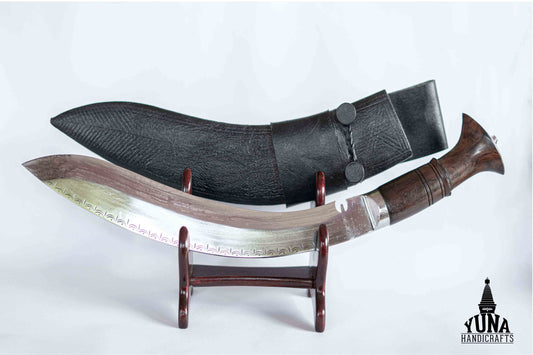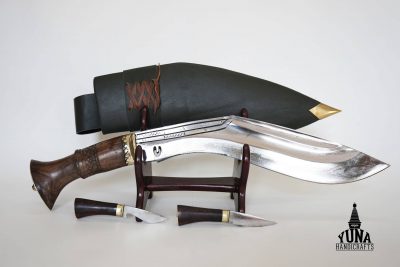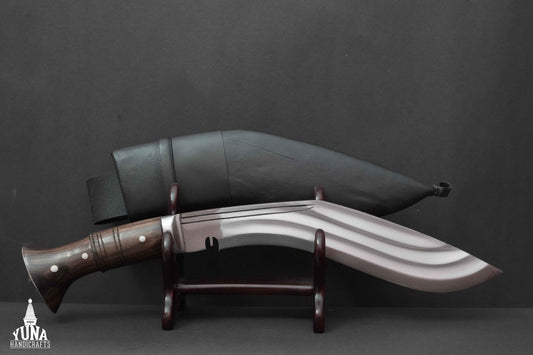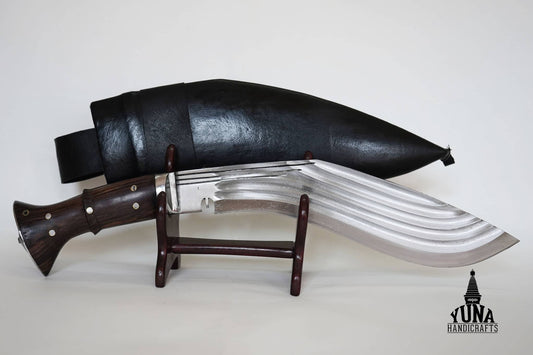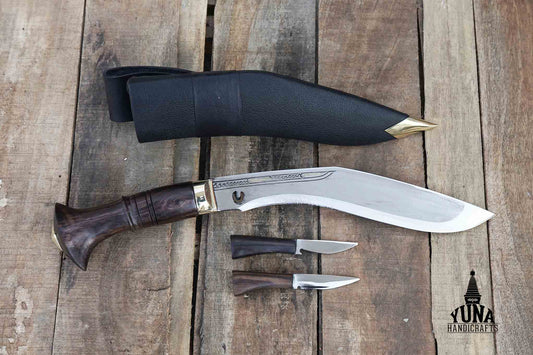
Is a Kukri legal in the UK?
Kukri as a Knife Legality
Purchasing a knife in the UK is legal if you are 18 or older, except for some exemptions we have listed in the section below. In this blog, we discuss these things you should know before and after buying a Kukri. To be safe, you should consult your local police department at 101 to check if you can own a Kukri or not. Many brands, including ours, have served customers in the UK with Nepali handicrafts, including Kukri.
Disclaimer: This is not legal advice, and you are responsible for your interpretations and any actions you take. We have done extensive research for this article, but it might not cover the full extent of the UK laws.
Why might Kukri be subject to strict regulations?
Kukri is a very versatile knife, and can be used for many purposes. This can be used to clear out the bushes, for your outdoor camping and bushcraft as a survival tool, and to chop meat. It is historically used for self-defense reasons, and the Gurkha Brigade in the UK military also carries these traditional Nepali Kukri. That's why you have to consider many legal obligations when buying, owning, selling, giving, and using a Kukri.
The Laws of the UK
Kukri is not explicitly mentioned in the buying and carrying knife UK laws on the official government page. But it might fall under many categories. You can call the police department or consult a legal advisor to be sure.
Kukri as a Knife or Weapon
Kukri is are large knife and is considered a bladed article, and carrying them in public is strictly regulated. You need a reasonable, lawful 'good reason' to carry a knife in public, but a Kukri might not be classified as just a knife, but a banned weapon too. Some good reasons for carrying a knife in public include the following:
- If your work needs it, perhaps like the Gurkha soldiers when in service
- Kukri, as a knife, is a part of your national costume
- for religious reasons
Self-defense is not a lawful reason to carry a knife in public, and you should not carry a Kukri in public. You should also be careful even when you have a good reason to carry a knife in public, as it is illegal to carry a weapon in a threatening way, and many weapons are strictly banned from even possession. What is considered threatening can be vague, and you could possibly get in trouble for carrying a Kukri in public. You can consult legal advisors and the police to understand it.
Banned Knives and Weapons
UK laws prohibit buying, selling, possessing, lending, and giving the knife or weapon to anyone if the weapon falls under one of the following categories:
| Knife or weapon type | Description |
| Baton | A straight, side-handled or friction-lock truncheon. |
| Belt buckle knife | A buckle that incorporates or conceals a knife. |
| Blowpipe or blow gun | A hollow tube out of which hard pellets or darts are shot by the use of breath. |
| Butterfly knife or ‘balisong’ |
A blade enclosed by its handle. Designed to split down the middle to reveal the blade without using a spring or other mechanical means.
|
| Cyclone or spiral knife |
A blade with a handle, a sharp point at the end, and one or more cutting edges that each form a helix.
|
| Disguised knife |
A blade or sharp point hidden inside something that looks like a commonly carried everyday object. For example, a comb, brush, pen, cigarette lighter, key, lipstick, or phone.
|
| Flick knife, gravity knife, ‘switchblade’ or ‘automatic knife’ |
A knife where the blade opens automatically or is released from the handle, either by gravity or by pressing a button or something else on the knife.
|
| Footclaw |
A bar of metal or other hard material is worn strapped to the foot, from which a number of sharp spikes come out.
|
| Handclaw |
A band of metal or other hard material worn on the hand, from which a number of sharp spikes come out.
|
| Hollow kubotan | A cylinder-shaped container containing a number of sharp spikes. |
| Knuckleduster |
A band of metal or other hard material that’s worn on one or more fingers and is designed to cause injury. This also includes any weapon that incorporates a knuckleduster.
|
| Kusari or ‘manrikigusari’ |
A hard weight or hand grip fastened to each end of a piece of rope, cord, chain, or wire.
|
| Kusari gama | A sickle fastened to one end of a piece of rope, cord, chain, or wire. |
| Kyoketsu shoge | A hook-knife fastened to one end of a piece of rope, cord, chain, or wire. |
| Push dagger |
A knife where the handle fits within a clenched fist and the blade comes out from between two fingers.
|
| Shuriken, ‘shaken’, ‘death star’ or ‘throwing star’ |
A hard, non-flexible plate with three or more sharp radiating points, designed to be thrown.
|
| Stealth knife |
A knife or spike made of a material that cannot be picked up by metal detectors and which is not made for use at home, for food, or as a toy.
|
| Sword |
A curved blade of 50 centimetres or over, based on the straight-line distance from the top of the handle to the tip of the blade.
|
| Swordstick |
A hollow walking stick or cane containing a blade that may be used as a sword.
|
| Telescopic truncheon |
A truncheon that extends automatically by pressing a button, a spring, or other device that’s in or attached to the handle.
|
| Zombie knife |
A knife with a cutting edge, a serrated edge, and images or words suggesting it is used for violence.
|
What do people say about Kukri?
This user post from Quora about Kukri legal terms in the UK provides another real user experience. Steve Freeman from the UK shares his experience on Quora:
"I have a Kukri at home, and it’s perfectly legal to have it. My Uncle gave it to me; he was given it after serving with the Gurkhas in Hong Kong.
What I can’t do, though, is walk around in public with it without a good reason, and as I am not a serving Gurkha soldier, I do not have one.
I have a sword at home too; this was my grandfather’s, then my uncle’s (also used by my father), ceremonial sword from their army service. Again, perfectly legal to have at home, but if you are walking around the streets with it, you will very quickly be met by armed police officers pointing big guns at you.
I also own a machete. I use this for gardening, in my own garden (my garden backs onto a small river and the bank gets very overgrown with brambles). If I were to walk down the street with it, I would meet the boys in tactical black again.
I own some very sharp kitchen knives as well. I use these in my kitchen to prepare food, but if I were walking down the street with a 9-inch carving knife in my hand, you’ve guessed it! Coppers in X5 BMWs, big guns, etc.
You might be beginning to see a trend here? You can own all sorts of sharp and dangerous objects in the UK as long as you are in the privacy of your own home or have a lawful purpose for having it with you in public. Self defence is not a lawful purpose, in case you were thinking of asking."
Legal Obligations and Penalties
As a responsible citizen, it is a must for you to know and follow your legal obligations. You must not carry a Kukri in public unless you meet these strict requirements, and even if you do so, it would be wise not to carry one in public. The penalty for carrying such an item without a lawful good reason can be substantial fines and up to 4 years in prison.
Conclusion
Kukri is more than a knife, and it carries a legacy of centuries. So owning it is tempting for sure. By doing extensive research, you can safely own a Kukri without facing the downsides. Please consult with a legal advisor or contact the police to know more details from official primary sources.
If you are ready to own a high-quality handmade Kukri from Nepal, we at Yuna Handicrafts are here for you. You can choose from our extensive range of around 2 dozen Kukris. With blade sizes ranging from 10 inches to 15 inches, we have something for everyone.
Citations
Source: GOV.UK — Selling, buying, and carrying knives and weapons (gov.uk)

